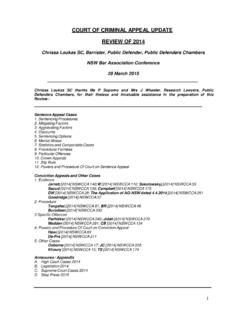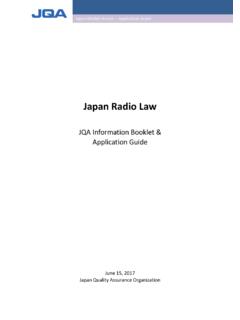Transcription of Early Guilty Pleas: A New Ball Game - Public Defender
1 Early Guilty Pleas: A New Ball Game Mark Ierace SC Senior Public Defender This paper is periodically updated. The last update was on 28 April 2018 Introduction ..3 The Commencement Date and Transitional Provisions ..4 The New Committal Procedure ..4 Overview ..4 The Chief Magistrate s Practice Note ..6 The NSW DPP/Police Protocol ..7 The Brief of Evidence ..8 The Extent of Disclosure: The Content and Form of the Brief of Evidence ..8 The Protocol Parts 2 and 3: The Content and Form of the Brief .. 11 The Protocol: Material that is Not Required in Admissible 13 Regulations: The Content of the Brief .. 14 The Protocol Part 4: Certification by Police of Compliance .. 14 The Protocol Part 5: Requests for Further Evidence .. 15 Early Briefing of Counsel .. 15 The Charge Certificate .. 16 The Purpose of the Charge Certificate .. 16 The Legislative Provisions.
2 16 The Protocol: Part 6 Charge Certification .. 17 The Magistrate Explains the Committal Process to the 17 Case Conferences .. 19 Regulations: The Case Conference .. 20 The Logistics of the Case Conference .. 21 The Case Conference Certificate .. 22 The Confidentiality of the Case Conference and the Certificate .. 23 The Accused s Legal Representative Explains the Purpose of the Case Conference .. 24 Model Explanations by Legal Representatives of the Scheme .. 24 2 Failure by the Accused to understand Part 3: A Question of Fitness? .. 26 Failure to Complete the Case Conference Certificate .. 27 Hearing of Evidence in the Local Court .. 28 Formal Statements are Required if a Prosecution Witness is to give Evidence .. 29 Section 289: Prescribed Witness Statements .. 30 The Act of Committal .. 30 Statutory Utilitarian Discount Caps .. 30 Limited Application to Commonwealth Matters and Offences of Young 30 Regulations a Transitional Provision.
3 31 Generally .. 31 The Amendments to the Crimes (Sentencing Procedure) Act 1999 .. 32 A Different Offence .. 34 A Table of Alternative 35 Fitness to be Tried .. 35 Amendment of Other Legislation .. 37 Children .. 37 Serious Children s Indictable Offences .. 37 Non-Serious Children s Indictable Offences Not Dealt With Summarily .. 38 Impact on the Drug Court .. 39 Specific Issues .. 39 What if a matter is complex? .. 39 The Brief of Evidence .. 39 The Charge Certificate .. 40 The Case Conference Stage .. 40 What if time is needed to obtain Defence Evidence? .. 41 Can an unwilling Accused Avoid a Case Conference? .. 41 Attachment A (Local Court Practice Note): Committal Proceedings Flow Chart .. 43 Attachment B (Protocol, Appendix A): Evidence Not Required in Admissible Form .. 44 3 Introduction The Justice Legislation Amendment (Committals and Guilty Pleas) Act 2017 ( the Act ), which was passed by parliament on 18 October 2017,1 introduces a legislative scheme ( the scheme ) that fundamentally changes the nature of committal proceedings, so that the Magistrate no longer determines the sufficiency of the prosecution evidence.
4 Instead, the role is supervisory, facilitating negotiations between the parties via case conferences and, in certain circumstances, permitting the taking of evidence of a prosecution witness or witnesses to facilitate issue-narrowing for negotiations or as part of trial preparation, before committing the matter to the higher court for trial, sentence or a fitness The Act also imposes mandatory caps on sentencing discounts in relation to state offences for the utilitarian value of a Guilty plea ( statutory utilitarian discount caps ). The scheme is the culmination of a major report by the NSW Law Reform Commission ( the LRC ) published in December 2014 titled Encouraging Appropriate Early Guilty Pleas 3 ( the LRC Report ), and consultations undertaken subsequently by the NSW Department of Justice with stakeholders; including the NSW Bar Association, the Public Defenders, the Law Society, Legal Aid NSW and the Aboriginal Legal Service ( the stakeholder negotiations ).
5 The Act is part of a package of three cognate Bills, the other two being the Crimes (Sentencing Procedure) Amendment (Sentencing Options) Bill 2017 and the Crimes (High Risk Offenders) Amendment Bill 2017. The Chief Magistrate has updated the Local Court Practice Note on Committals ( the Practice Note ) to include a presumptive timetable for Local Court proceedings. On 23 February 2017, the NSW DPP and the NSW Police Commissioner released a protocol governing their responsibilities to each other under the legislation. A revised version was signed and released on 28 April 2017 ( the Protocol ). Amended regulations for each of the three Acts took effect from 30 April This paper summarises and discusses the key aspects of the scheme but it is of course appropriate to read all the statutory provisions thoroughly.
6 More so than is usually the case, it is important to read the new legislation alongside the 2nd Reading This is because much of the intended operation of the scheme is administrative rather than court-based and the 1 The Act amends a number of statutes, including the Criminal Procedure Act 1986, the Children (criminal Proceedings) Act 1987, the Crimes (Sentencing Procedure) Act 1999 and the Mental Health (Forensic Provisions) Act 1990. 2 The definition of committal proceedings in , Criminal Procedure Act 1986, which presently is committal proceedings means a hearing before a Magistrate for the purpose of deciding whether a person charged with an indictable offence should be committed for trial or sentence will be replaced by: committal proceedings means proceedings before a Magistrate for the purpose of committing a person charged with an indictable offence for trial or sentence.
7 3 The Report, No. 141, can be downloaded from the NSW LRC s website, at: 4 Amended by the Criminal Procedure Amendment (Committals and Guilty Pleas) Regulation 2018. 5 Hansard, Legislative assembly, , page 1. 4 legislation only tells part of the story. For the same reason, it is also likely that the 2nd reading speech will be an important aid in interpreting the This paper is a critical analysis. It is to be hoped that in due course there will be a review of the scheme s operation. It is disappointing that legislation introducing such a significant change to criminal procedure, involving qualifications of fundamental rights of the accused, did not include provision for a review in due course. The Commencement Date and Transitional Provisions The new legislative scheme commenced on 30 April 2018. The Criminal Procedure Regulation 2017 ( the Regulations ), , provides that the previous Act continues to apply to committal proceedings that commenced before the amendments made to Part 3 of the Act by that amending Act commenced.
8 (italics added). A similar transitional provision is in the Crimes (Sentencing Procedure) Regulation 2017 ( Part 6 Miscellaneous ). Section 55(a) of the Act provides that: committal proceedings are commenced by the issuing and filing of a court attendance notice . Accordingly, the new legislative scheme applies to matters where the court attendance notice was issued and filed on or after 30 April 2018. The New Committal Procedure Overview Schedule 1 of the Act introduces a re-drafted Part 2 of Chapter 3 of the Criminal Procedure Act 1986, which sets out a new Local Court procedure for the committal of NSW and, subject to some qualifications considered in the commentary below, Commonwealth indictable offences. References hereinafter in this section of the paper, dealing with the new committal procedure are to the new sections of that Act, unless otherwise indicated.
9 The new committal procedure, but not the statutory utilitarian discount caps, applies to children who are charged with serious children s indictable offences and thus dealt with according to law. A different committal procedure applies to children who are charged with non-serious children s indictable offences which are not dealt with summarily; see Children , below. A statutory outline of the new committal process is provided by : 55 Outline of committal proceedings steps Subject to this Part, the steps for committal proceedings are generally as follows: (a) committal proceedings are commenced by the issuing and filing of a court attendance notice, (b) a brief of evidence is served on the accused person by the prosecutor, (c) a charge certificate setting out the offences that are to be proceeded with is filed in the Local Court and served by the prosecutor on the accused person, 6 Interpretation Act 1987 NSW, (2)(f).
10 5 (d) if the accused person is represented, 1 or more case conferences are held by the prosecutor and the legal representative for the accused person, (e) if the accused person is represented, a case conference certificate is filed in the Local Court, (f) the accused person pleads Guilty or not Guilty to each offence being proceeded with and the Magistrate commits the accused person for trial (if the accused person pleads not Guilty ) or for sentence (if the accused person pleads Guilty ). A more comprehensive overview of the legislative scheme was provided by the Hon. Mark Speakman SC in his 2nd Reading Speech introducing the Bill,7 incorporating some of the out-of-court aspects and providing a rationale for the in-court elements: There are five elements to the legislative reforms. First, the investigating agency that charged the accused person with the offence, usually the NSW Police Force or the Australian Federal Police, will provide a simplified brief of evidence to the Office of the Director of Public Prosecutions [ODPP] or its Commonwealth equivalent, the Commonwealth Director of Public Prosecutions [CDPP].











